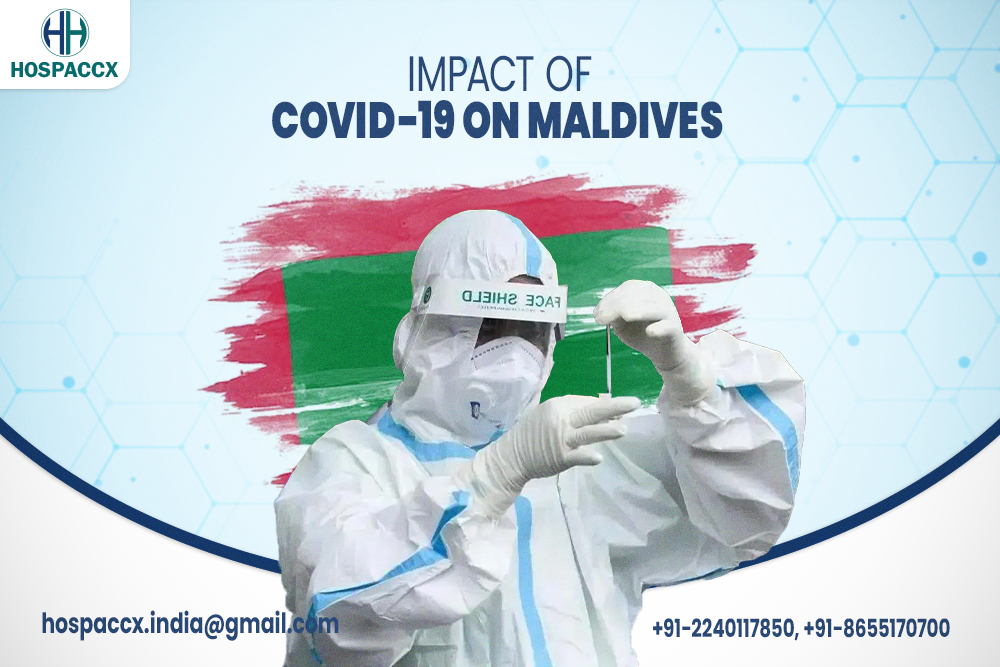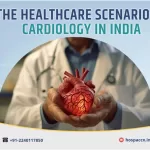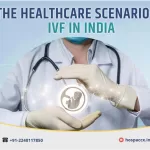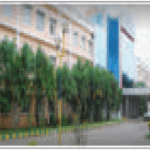IMPACT OF COVID-19 ON MALDIVES
Are you wondering how a tourist-hotspot like Maldives would have been impacted by the dreadful COVID 19 pandemic? Are you wondering how the country managed to survive during the pandemic, especially in their healthcare sector?
Hospacxx Healthcare Consultancy presents in this article, the impact that the Maldives nation had to face during the pandemic and the consequential changes as a result.
INCEPTION OF COVID 19 IN MALDIVES
The COVID virus was confirmed to have spread to Maldives on around March 2020 from a 69-year-old Italian tourist who had returned to Italy after spending holidays in Kuredu Resort & Spa. Since then, there has been a rapid increase in the number of covid cases, mainly through frequent visits by migrants and other tourists in the country.
After the detection of two more positive cases in a span of a week, the Maldivian Ministry of Health had declared a Public Health Emergency under Section 33 of the 7/2012 Public Health Act for a period of 30 days and it was been extended since then. The Public Health Emergency, which was declared on 12th March 2020, was finally revoked on 13th March 2022 by the Maldivian Ministry of Health.
THE IMPACT OF COVID-19 IN THE MALDIVES
Population: – According to the recordings from Worldometer, as of 2022, the number of positive COVID cases are 178,883, out of which, 298 cases led to deaths while 163,687 cases managed to recover successfully from the infection. During the year 2020, there were two Covid pandemic waves, among which the highest peak period was between August to September 2020. It was noted that out of all the total positive cases detected during the year 2020, the following indications were found: –
- 68% of the positive cases were males, wherein majority of the males were the Maldivian locals.
- Majority of the COVID-19 cases were among younger adults who had no major comorbidities and the disease were mild.
- Highest number of deaths were among the Maldivian local men (about 26), while there were only 7 deaths among the foreign men. Among females, the local women had the highest deaths (about 15), while there were no deaths among foreigner women.
- The highest number of deaths occurred amongst individuals above 65 years of age.
Economy: – Tourism makes up 38.9% of the Maldives’ GDP. In a country that heavily relies on tourism for its income, the travel bans from COVID-19 have caused a decline in the economic growth. In 2019, visitor arrivals increased by 14.7%, a record of 1.7 million. According to The World Bank, the revenue fell by about 23.4% in 2020’s first quarter. The spending of reserves increased by 10.2% causing an estimated GDP contraction of 8.5%.
Many citizens’ jobs were in the tourism sector. Since a good amount of the Maldives’ GDP is reliant on tourism, One-third of adult males and a quarter of women work in tourism jobs.
COVID-19 in the Maldives, unfortunately, led to a decrease in household earnings for these families as many of their jobs have been placed on hold. The poverty line was subsequently expected to rise as families experience a lack of funds.
Across the regions of the Maldives, there were large gaps in welfare. The southernmost atolls are the most affected with 1 in 5 living in poverty.
In order to combat these issues, the Maldivian government has established a price ceiling for staple foods, beverages and supplies to help families save money.
MEASURES TAKEN DURING THE PANDEMIC PERIOD
According to the Health Statistics Report of 2020 by the Maldivian Ministry of Health, the following measures were taken for effective management during the Covid Pandemic: –
- In Maldives, the surveillance of COVID-19 cases was carried out by the practice of 3T’s which are to Test, Trace and Treat (through isolation or quarantine and care).
- The National Emergency Operations Centre was established (co-chaired by Ministry of Health with Defense Minister) to oversee the activities of stakeholder agencies and National Emergency Preparedness, Readiness and Response Plan when COVID-19 was developed.
Health Financing: – Since COVID-19 pandemic has resulted in decrease of the government revenues, adequate funds for health was mobilized, to protect the population from financial crises and impoverishment associated with use of health care services.
- With the declaration of State of Public Health Emergency, a contingency budget of MVR 212 million (USD 14 Million) was allocated by the Ministry of Finance. The emergency reserve funds were also utilized. There were more relaxed procurement and hiring rules related to the emergency response.
- Financial protection for all was (health insurance scheme) implemented wherein the medical care cost for Maldivians is covered under this health insurance scheme.
- As the budget deficit could be higher than the approved national budget for 2020, Foreign Aid has played an integral role in COVID-19 response. Resources were mobilized through International Financial Institutions (USD 64.1 million), Bilateral Partners and UN Agencies (in the form of grants, technical support and in-kind contributions).
According to the weekly report by The Ministry of Finance for COVID-19 Response Expenditure the total government expenditure on COVID-19 response (as of June 2020) is approximately MVR 923.2 million (USD 59.4 million).
Hospitalizations & other Emergency services: – According to a report by the World Health Organization (Maldives), the provision of healthcare services was determined based on the emergency levels set for transmission scenarios, either through continuation of routine services or provision of only essential health services.
- In preparation for COVID-19, designated hospital beds were prepared across the country with a total of 393 hospital beds, (250 beds in Greater Male’ Region and 143 in the atolls) and 110 critical care beds (ICU/HDU beds) of which 40 were in GMR and 70 across the atolls. The government had also identified 3000 bed capacity for quarantine and 2000 beds for isolation centers, which were utilized across Maldives as per the need.
- Protocols were implemented for establishing effective patient flow (through screening, triage and referral system) at all levels for COVID-19 and non COVID19 patients.
- Infection Prevention Control (IPC) measures were strictly implemented to ensure healthcare workers and patients safety in several health care delivery situations.
According to a report by The Maldivian Ministry of Health, towards the end of August 2020, almost 80% hospital beds available for COVID-19 cases were occupied. Similarly, ICU bed occupancy also reach almost 30% in August 2020.
- Thus, all non-essential elective procedures and surgeries were postponed and prioritized for only emergency life-saving surgeries. Through primary care approach, the service delivery for early detection and preservation of functional capacity was carried out at the island/atoll level in order to ensure ongoing health care provision for all conditions.
- Medical transfers between islands for essential services such as chemotherapy, blood transfusions, giving birth and dialysis was introduced. According to a WHO report, as of April 2020, 161 people were transferred. For emergency evacuation services, 339 people were transferred. Whereas for expatriates/tourists who are suspected/positive for COVID19, all measures for medical evacuation to isolation/quarantine facilities was arranged by the government of Maldives.
Healthcare Manpower: – According the WHO report on healthcare response to COVID 19 in Maldives, the goal was to use limited health workforce more efficiently with the available resources to achieve the best health outcomes.
- Planning of health workforce requirements was done based on the transmission scenario and thus, a contingency plan was developed for the re-distribution of health workforce to cater for the increased demand on Health Care Workers (for both COVID19 and essential health services). As per the requirements, non-government/private sector health workforce, licensed retirees, medical trainees and volunteers were mobilized to each designated COVID Centre, with optional accommodation arrangements for frontline health workers.
- Trainings were conducted to enhance professional skillset of health workforce. These trainings were carried out through practical sessions or web-based sessions, for priority services such as critical care, clinical case management, IPC, waste management, contact tracing, laboratory testing, risk communication etc.
- The World Health Organization had facilitated multiple webinars and consultation with experts to establish proficiency in COVID-19 case management and IPC. The World Health Organization and other UN partners have assisted government through various capacity building activities, training and additional support staff for COVID-19.
Implementation of Digital Health Systems: – According to a report by WHO (Maldives), in order to limit encounters with service providers, optimal service delivery platforms (e.g; outreach mechanisms, teleconsultations, e-prescription renewal and delivery of medicines for long term elderly care, management of chronic care diseases) were utilized based on the disease burden and country context (e.g; identifying elective care and essential care) across Maldives, especially in Greater Male area.
- Identification of essential health services and development of Electronic Healthcare Systems was done for the country based on disease burden and transmission scenario (e.g; essential prevention and treatment services for communicable diseases including vaccination, RMNCAH, managing chronic diseases including mental health conditions, access to safe blood, emergency care) for Greater Male area and other islands/atolls.
- Tele-consultations were implemented to ensure continuity of care for non-COVID-19 patients who require specialist care, and for patients under long term medications requiring follow-up. During the pandemic period, Amrita Hospital had introduced tele-consultation facilities to review for cancer patients and patients with other long-term illnesses
- Online platforms were established through which individuals who are on long term medication can request and get prescription delivered to home (prescribed medicines are covered under health insurance scheme).
- Web-based platforms like Chatbots and other digital health tools were used to both screen (triage) and treat patients with COVID-19 to help limit the virus spread.
- The Government utilized WHO’s supply of forecasting tools (such as ESFT, and HWF bed capacity tool) for projections and plan-efficient use of limited resources covid-19 care system which was developed in collaboration with IGMH (government tertiary hospital) and Ministry of Health, to ensure timely collection and management of accurate data and enable exchange of medical records related to suspected/confirmed COVD-19 patients receiving inpatient care in any health facility across Maldives.
- ARI/ILI surveillance systems were implemented for ensuring effective community surveillance for early detection of cases, for routine surveillance of communicable disease (SIDAS), outbreak investigation and visualizing chains of transmission through field data collection and contact follow-up (Go, Data) and for managing health information system data (DHIS2).
Access To Medicine, Medical Products and Supplies: – The measures to ensure equitable access to essential medicines and technologies of assured quality and safety were implemented as follows: –
- Maintaining access and availability of essential medicines, equipment and supplies by engaging in regular stock management and forecasting and at all level (regional and central).
- Fast-tracking of necessary import license and permits for essential medicines through Maldives Food and Drug Authority.
- Supply and logistics are coordinated by Maldives National Defense Force (MNDF) and Maldives Police services under the guidance of Health Protection Agency (HPA).
Till date, WHO is supporting procurement of controlled drugs which is in limited stock and crucial for drug withdrawal patients and for the treatment of mental health conditions to ensure availability and continuity of service. WHO had also facilitated joining the Solidarity Call for Action initiative by Government of Costa Rica with WHO partnership to support making tests, vaccines, treatments and other technologies to fight for COVID-19 equitable accessible to all. Currently efforts are ongoing for enabling Maldives participation in Solidarity Clinical Trial for COVID19 treatment.
According to a WHO report, in view of the above-mentioned COVID emergency measures, key challenges that were faced during the implementation were: –
- Lack of COVID19 diagnostic/infrastructure availability at peripheral level.
- Due to geographic dispersion of islands, there was difficulty in sample transportation and some delay in supply of essential medicines and equipment.
- Delay and restrictions in accessing tertiary level care which was based on the central level owing to lockdown.
- Health Workforce burnout and limited staff for health response.
- Integrated health information system needed to be made fully functional to provide up to date data for monitoring essential health service indicators.
CONCLUSION
The Maldivian nation initially struggled to tackle obstacles related to the consequences from rapid spread of the infection, depreciation in the GDP due to the temporary halt on their tourism sector and other exports trade and limited availability of healthcare resources for provision of optimal COVID care, especially in emergency cases.
But, with the help of International Regulatory bodies like WHO, UN, support from neighboring countries and emergency health measures by the Maldivian Government, the nation was able to survive through the dreadful impact of the pandemic with the support of financial and health resources available to them. Like a silver lining in dark times, digitalization of healthcare services was introduced through tele-consultation, Electronic Health Records, Web-Based Community Surveillance etc. which reduced the hospitalization burden on health centres and hospitals and facilitated better management of COVID-19 and non-covid cases alike.
Hospacxx Healthcare Consultancy provides their expertise across Indian & International states in services like Planning & designing with project management consultancy, Operations Management consultancy, financial management and more. For more information, you can visit the company website on www.hospaccxconsulting.com or contact us directly.
Related Team Members
Related Services
Other Industries
Related Blog
Related Success Stories










